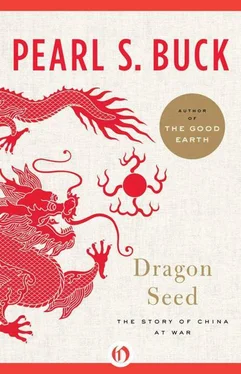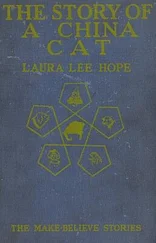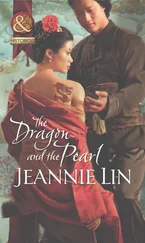The shop was open and the two clerks there, but not all the cases were full nor was all the glass mended. She went about looking for what used to be there and she saw that much of it was gone. What was left were such cloth and small goods as could be bought in any little village shop. All the bright things, the strange foreign things, the lamps and lights and toys and straw hats and rubber shoes, the cups and bowls and dishes with flowers on them of a foreign color were gone. She knew then that the loss here had been very great and that her daughter’s husband had not dared yet to make it right, and he must fear trouble to come.
So with her full lips pursed together she went back of the shop and found all worse than she had feared. Her daughter’s husband sat slack in his chair, his flesh so fallen away that with the fat gone he looked as though his skin were a garment too big for him. Never had she seen such once-fat jowls hang down in such dewlaps, or a belly once full so overhang itself like a windless bag. He lay asleep when she came in and her daughter sat beside him fanning him. When she saw her mother she made a sign for silence and dared not give over fanning.
Ling Sao bent to whisper in her daughter’s ear. “Is he ill that he looks so slack?”
“Ill with bad luck,” her daughter whispered back. “He cannot eat.”
Now Ling Sao knew very well that when a creature, man or woman or beast, cannot eat his food he is on his way toward the grave, and she was frightened at the thought of her daughter a widow so young, and so she stole into the house and without stopping to look at the children or to greet her son-in-law’s mother, she rolled up her sleeves and went into the kitchen and pushed aside the servant who stood at the stove.
“Mend the fire for me,” she told the woman with such will that the woman obeyed even without greeting. “Begin it small,” Ling Sao commanded her. “When I bid you, let it burn up quickly for the space of a hundred breaths. Then make it small again.”
Out of the eggs she had brought and with some bits of meat and onion she found in a bowl on the table she made a dish so fragrant with goodness that Wu Lien, waking a little to brush off a fly, smelled it and opened his eyes.
“What is that fine smell?” he asked.
“My mother has brought some new eggs from the country and she is cooking them,” his wife replied.
“I can eat them,” he said.
When his wife heard this she ran into the kitchen at the moment that Ling Sao was lifting the eggs into a bowl and she seized the bowl.
“He wants them,” she cried, and took up some chopsticks as she ran and she gave the bowl to Wu Lien.
Now Wu Lien had eaten nothing or as good as nothing since the day his shop was ruined, and because he was a man who filled himself full three times a day by habit, his hunger was gradually rising in him though he had not known it and thought himself as low as the first day. Here was this good food under his nostrils, eggs such as a city man does not know from birth to death, and he plunged in his two chopsticks and did not take the bowl from his face until it was empty. Ling Sao and her daughter stood watching him, and the two women’s eyes turned to look at each other in their pleasure and then back at him again. When he brought the bowl down empty they laughed, and then a great belch of wind came up out of him and they laughed again.
And Ling Sao cried, “I know why I felt I must come here today, and my old black hen who lays an egg once or twice a month laid an egg four days together and the yellow one two eggs, one day after another, and so the gods work their will. Now you are well.” She turned to her daughter, “Fetch him the hottest tea he can drink and he will be as good as the first day he was born.”
While her daughter did this she sat down and shouted for the youngest child to be brought to her, for Ling Sao was a woman who never felt herself whole unless she had a child on her knees or across her hip, and so while she held her daughter’s youngest child naked except for his wetting cloth in her hand under him, she watched Wu Lien drink his hot tea and his last wind came up and while this was going on she talked to him for his good.
“Whatever the ill, you ought not to stop your food or to let your flesh waste away,” she said. “You must remember that you have parents and sons and no man belongs to himself but to these before him and after him. If he lets himself be destroyed, or if he destroys himself, the proper relationships are broken off and the nation will fall.”
Wu Lien opened his eyes heavily at her. “Who knows but that the nation must fall anyway, old mother?” he said sadly.
Ling Sao looked at her daughter, not understanding such talk.
“That is all he thinks about,” the young woman said. “Over and over again he says the nation will fall.”
Ling Sao fanned herself briskly. “The nation is nothing except the people and we are the people,” she said. “You, Wu Lien, ought not to consider that one day of ill luck can overthrow you. You must buy more goods and put in your foreign things again and call upon the city to protect you and so take heart.”
But Wu Lien only groaned. “I have bad news to tell,” he said, “I have saved it in myself for these three days — four days tomorrow, it will be.”
Ling Sao interrupted him. “There you have been wrong,” she said. “To keep ill news in your belly spoils the liver and dries the gall. Anger and sorrow and ill news — all must come out, for the body’s health.”
“It is not my private ill fortune,” Wu Lien said. “This is ill news for the nation. The East-Ocean enemies have sent their ships to the coast nearest us and their soldiers have stepped upon our land and our soldiers have met them but we are not strong enough for them.”
Now Wu Lien knew when he said this that the minds of the two women could not comprehend what he was saying. They had never been away from this city and the countryside around; and to them the two hundred or so miles that lay between here and the coast were like two thousand. They had never sat in a train nor even in a foreign spirit car nor had they been the seven miles to the river port to see a foreign ship. All they knew was that once, years before, these foreign ships had let their guns out against a wandering army in this city, because they held some foreigners, and in the country Ling Tan’s household had heard the distant guns like thunder and they had often talked of it, until they forgot it.
“Do you remember those guns you once heard?” Wu Lien now asked. “There are now such guns at the coast, laying waste that city there.”
“I remember them,” she said comfortably. “I was scraping out the rice cauldron with sand and it clattered in my hands and rang an echo. I cried out to my old man that it was an earthquake. But in the end no harm came of it.”
“Harm will come of this,” Wu Lien said, groaning. For he was a merchant and twice each year he went to the coast to buy his goods and he knew the city there very well, and he could see what was ahead of him now. The students who had destroyed his goods were only the forerunners of the evil to come. He dared not buy any more such goods, and if he did not, what had he to sell in his shop that could not be bought anywhere?
“Comfort yourself,” Ling Sao said. “The sea is very far away, and even the river is far enough. What can they do to us?”
“They have flying ships,” he said. It made him angry that these two women would not be afraid and he wanted to make them share his own fears. So he went on to sound as fearful as he could imagine. “Those flying ships can come up from the sea in two hours and let their eggs down on us and burst our house apart into dust and what can we do against them?”
Читать дальше












